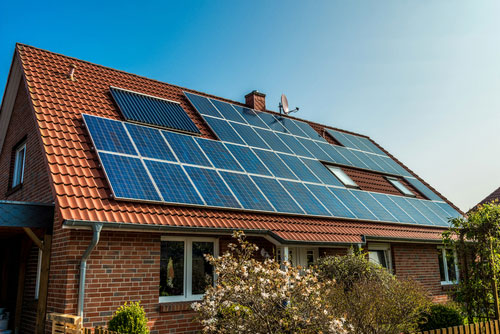An Overview of Solar Energy: A Look at the Benefits and Challenges
Solar energy is an increasingly popular form of renewable energy that can be used to power homes, businesses, and communities. It offers numerous benefits, including lower electricity bills, increased energy independence, and reduced air pollution. However, there are some challenges associated with solar energy that need to be addressed. In this article, we’ll take a look at the benefits and challenges of solar energy.
Benefits
The most significant benefit of solar energy is that it is a renewable energy source. This means that it can be used to generate electricity indefinitely, unlike fossil fuels, which are finite resources. Solar energy is also a clean energy source, meaning that it does not produce any air pollution. This can help reduce the amount of greenhouse gases in the atmosphere and can help combat climate change.
Solar energy can also dramatically reduce electricity bills for homeowners and businesses. Solar panels are relatively inexpensive to install and require minimal maintenance. This means that the long-term costs of having solar panels installed are often less than the cost of purchasing electricity from a utility company.
Challenges
One of the major challenges associated with solar energy is that it is dependent upon the weather. If it is cloudy or rainy, solar panels will not be able to generate as much electricity. This can make it difficult for solar energy to be used as a reliable source of energy.
Another challenge is that solar energy is still relatively expensive to install. While the cost of solar panels has been decreasing steadily over the years, it is still more expensive than purchasing electricity from a utility company. This can make it difficult for lower-income families to take advantage of the benefits of solar energy.
Finally, there are still some regulatory issues that need to be addressed. In some areas, regulations make it difficult for homeowners and businesses to install solar panels. This can prevent people from taking advantage of the benefits of solar energy.
Overall, solar energy offers numerous benefits, such as lower electricity bills and reduced air pollution. However, there are still some challenges associated with solar energy that need to be addressed. With continued research and development, these challenges can be overcome and solar energy can become an even more viable option for powering homes, businesses, and communities.
What You Need to Know About the Economic Case for Solar Energy
The economic case for solar energy is becoming increasingly compelling as the technology continues to develop and become more cost-effective. Solar energy is an efficient and sustainable way to generate electricity while helping to reduce our dependence on fossil fuels. With solar energy, homeowners and businesses alike can benefit from cost savings, improved air quality, and a healthier environment.
When it comes to cost savings, solar energy is becoming increasingly competitive with traditional electricity sources. Solar energy is often more cost-effective than electricity generated from fossil fuels, as costs continue to drop due to technological advancements and economies of scale. In addition, solar energy offers an attractive return on investment, with many homeowners and businesses seeing payback periods of five to 10 years.
Solar energy also has significant environmental benefits. By reducing the amount of carbon dioxide released into the atmosphere, solar energy can help to reduce global warming and climate change. In addition, solar energy can help to reduce air pollution, as it does not create any emissions when generating electricity.
Finally, solar energy is becoming increasingly accessible to homeowners and businesses alike. With the help of solar loans, leases, and power purchase agreements, homeowners and businesses can easily and affordably install solar panels to begin generating their own electricity.
The economic case for solar energy is strong, and its benefits are becoming increasingly clear. With cost savings, improved air quality, and a healthier environment, solar energy is an attractive option for homeowners and businesses alike.
How Solar Energy is Revolutionizing Energy Production and Consumption
The world is in the midst of a renewable energy revolution, and solar energy is leading the charge. Solar energy is revolutionizing the way energy is produced and consumed, providing an alternative to traditional fossil fuels that is both more efficient and more environmentally friendly.
As the cost of solar energy technology continues to drop, its popularity has skyrocketed. Solar panels are now being installed on homes and businesses across the world, providing homeowners and businesses with the opportunity to generate their own electricity. Solar energy is also being used in large-scale projects to generate energy for entire communities and even entire countries.
In addition to producing energy, solar energy is also helping to improve energy consumption. The use of solar energy has enabled people to reduce their reliance on traditional energy sources such as coal or natural gas. Solar energy can be used to power heating and cooling systems and other appliances, saving homeowners and businesses money in the process.
Solar energy has also enabled the development of new technologies that allow people to use energy more efficiently. For example, solar-powered batteries can store excess energy generated during the day so it can be used at night or during periods of low energy demand. This helps to reduce the amount of energy that needs to be generated from traditional sources.
Finally, solar energy is helping to reduce emissions of greenhouse gases. As more and more people switch to solar energy, the amount of carbon dioxide being released into the atmosphere is decreasing. This is helping to slow down the effects of climate change and create a more sustainable future.
Solar energy is revolutionizing energy production and consumption in a way that has never been seen before. As the technology continues to evolve and become more cost-effective, its popularity is only expected to grow. This is great news for the environment and the future of energy production and consumption.
The Latest Developments in Solar Technology and What They Mean for the Future
The solar energy industry is constantly evolving, with new developments and technologies emerging every day. This means that the future of solar energy looks brighter than ever. Here, we take a look at some of the latest developments in solar technology and what they mean for the future.
One of the most exciting developments in solar technology is the emergence of solar paint. This paint is composed of nanoparticles that can absorb light and turn it into energy. This technology could potentially be used to coat entire buildings and structures, creating a completely renewable energy source.
Solar shingles are another exciting development. These shingles are designed to look like roof tiles and are embedded with solar cells. They work much like traditional solar panels, converting sunlight into electricity. Solar shingles are much more aesthetically pleasing than traditional solar panels, making them an attractive option for homeowners.
The development of energy storage devices is also transforming solar energy. These devices store energy from the sun during the day and use it to power homes at night. This means that homeowners can take advantage of the power of the sun, even when it’s not shining.
Finally, the emergence of smart grids is making it easier than ever to monitor and manage solar energy. Smart grids allow for the efficient distribution of energy, making it easier to track energy usage and ensure that the energy is being used efficiently.
These developments in solar technology are making it easier than ever to take advantage of the power of the sun. With more efficient storage and distribution options, homeowners can make the most of their solar energy. Smart grids are also making it easier to monitor and manage energy use, helping to ensure that solar energy is used as efficiently as possible.
Overall, these developments in solar technology are paving the way for a brighter future for solar energy. With more efficient and cost-effective solutions, solar energy is becoming more accessible than ever. With these developments, the future of solar energy looks brighter than ever.
Exploring the Impact of Solar Energy on Climate Change and the Environment
The sun is a natural source of energy that has been harnessed for centuries. Over the past few decades, however, solar energy has become much more than a simple source of light and heat. In fact, it has the potential to be a major player in the fight against climate change and a cleaner environment.
The primary way solar energy can help mitigate climate change is through the production of electricity. Solar power plants generate electricity by taking advantage of the sun’s energy. This electricity can then be used to power homes, businesses, and other buildings, eliminating the need for fossil fuels and their associated greenhouse gas emissions. Furthermore, solar energy can be stored in batteries, providing a steady supply of electricity even when the sun isn’t shining.
In addition to helping reduce emissions, solar energy can also have a positive impact on the environment. Solar panels do not emit any pollutants and require very little water to operate, making them much more sustainable than traditional sources of energy. Furthermore, solar energy can be used in remote areas, eliminating the need for expensive and energy-intensive infrastructure projects.
Finally, solar energy can help create jobs. The installation and maintenance of solar energy systems require skilled labor and can provide economic opportunities in communities that have traditionally lacked access to energy sources.
In short, solar energy has the potential to be a major force in the fight against climate change and a cleaner environment. It is a clean, sustainable, and inexpensive source of electricity that can create jobs and provide energy to people who are not connected to the grid. The time has come for us to embrace the power of the sun and take advantage of this abundant source of energy.






